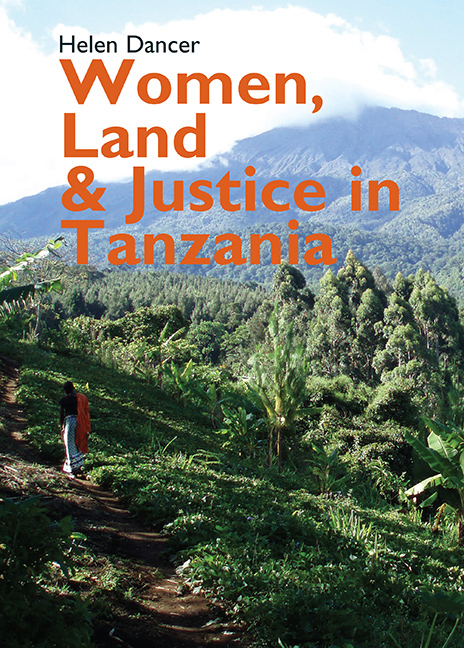Book contents
- Frontmatter
- Dedication
- Contents
- Acknowledgements
- Glossary of Kiswahili and Vernacular Words
- List of Abbreviations and Acronyms
- Table of Legislation
- Table of Cases
- Introduction
- 1 Social Origins of Women’s Claims to Land: Gender, Family and Land Tenure in Arusha
- 2 Women’s Claims to Land in Tanzania’s Statutory Framework
- 3 Making Legal Claims to Land: Agency, Power Relations and Access to Justice
- 4 Doing Justice in Women’s Claims: Haki and Equal Rights
- 5 ‘Shamba ni langu’ (The shamba is mine): A Case Study of Gender, Power and Law in Action
- Conclusion
- Appendix – Case reports
- Bibliography
- Index
- Eastern African Studies
2 - Women’s Claims to Land in Tanzania’s Statutory Framework
Published online by Cambridge University Press: 11 June 2021
- Frontmatter
- Dedication
- Contents
- Acknowledgements
- Glossary of Kiswahili and Vernacular Words
- List of Abbreviations and Acronyms
- Table of Legislation
- Table of Cases
- Introduction
- 1 Social Origins of Women’s Claims to Land: Gender, Family and Land Tenure in Arusha
- 2 Women’s Claims to Land in Tanzania’s Statutory Framework
- 3 Making Legal Claims to Land: Agency, Power Relations and Access to Justice
- 4 Doing Justice in Women’s Claims: Haki and Equal Rights
- 5 ‘Shamba ni langu’ (The shamba is mine): A Case Study of Gender, Power and Law in Action
- Conclusion
- Appendix – Case reports
- Bibliography
- Index
- Eastern African Studies
Summary
In legal contexts, land, marriage and inheritance issues often tend to be treated as distinct categories, both in the formulation of statute and in the shaping of the court system. This is the case in Tanzania. Yet, in circumstances where claims to land are in essence gendered and intergenerational, these three issues become inseparable in practice. This chapter extends the discussion of local customary practices in Chapter One to critique the contemporary Tanzanian statutory framework relating to land matters in the context of land claims within family life. This encompasses two aspects: the substantive content of the law with respect to land, marriage and inheritance matters, and the procedural framework that litigants are expected to follow in pursuing their claims.
THE LAND ACTS OF 1999
The Land Act and Village Land Act of 1999 marked the first comprehensive statutory reform on land matters in mainland Tanzania since the country's independence. The Acts were also an important legal landmark for gender equality, enshrining the right of every woman to ‘acquire, hold, use and deal with land … to the same extent and subject to the same restriction … as the right of any man’. This was not the first time that Tanzania had led the way in advancing women's property rights in the region. In the 1960s, although a Kenyan Commission had made recommendations for marriage law reform in its 1968 Report on the Law of Marriage and Divorce, it was in Tanzania that the Report’s proposals were first translated into legislation. As such, Tanzania’s Law of Marriage Act (LMA) of 1971 was the first of its kind in Commonwealth Africa (Read 1972: 19). Its recognition of married women's equal rights to ‘acquire, hold and dispose of property’ was progressive and this provision of the LMA is clearly echoed and extended to ‘every woman’ in the Land Acts.
The picture concerning Tanzania's inheritance and succession laws is rather different. Despite long-running and widespread calls for statutory change, including a 1995 Law Reform Commission Report on Succession, there has been no equivalent reform in this area. The Indian Succession Act of 1865 came into operation in Tanzania in 1920 during the British colonial period and codifies a gender-neutral English common law on succession. It was and still is applicable to Christians and persons of European origin in Tanzania.
- Type
- Chapter
- Information
- Women, Land and Justice in Tanzania , pp. 48 - 75Publisher: Boydell & BrewerPrint publication year: 2015



